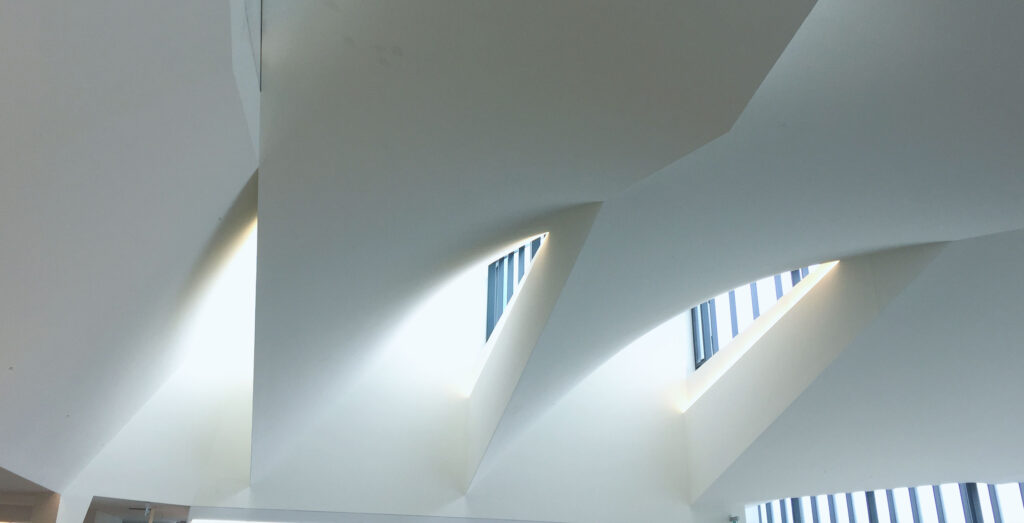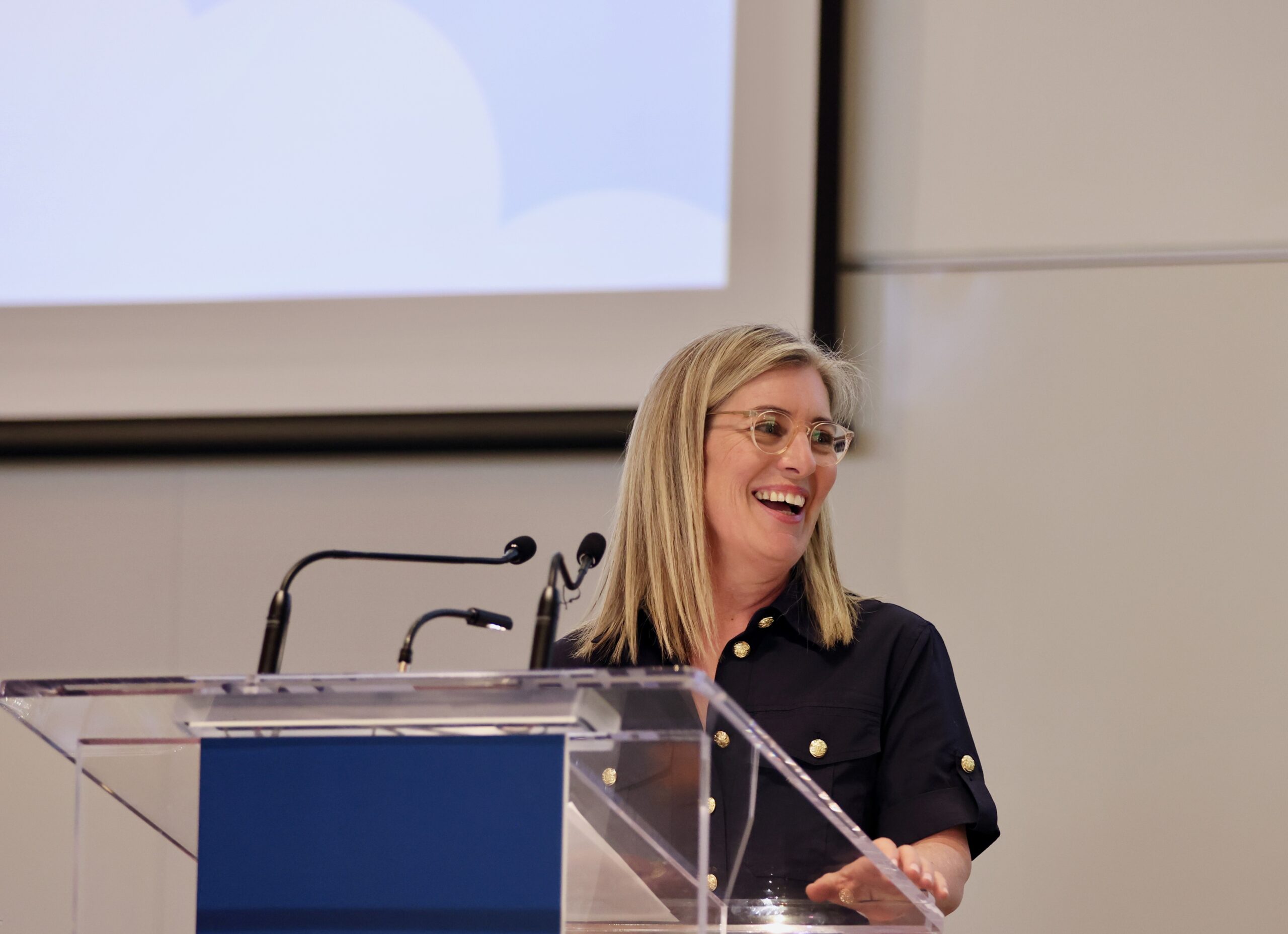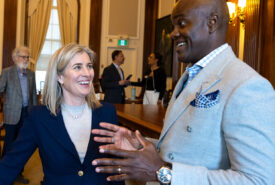Professor Meric Gertler’s address at the second annual Science Leadership Program dinner.
Check against delivery.
Thank you Professor Jayawardhana for that kind introduction. More importantly, thank you for your leadership and remarkable efforts sharing the excitement of science across a wide audience.
Thank you also to the members of the planning advisory group. This second year of the program builds nicely on last year’s inaugural success. Word is getting out: we have had applications from a broader range of units at U of T and a growing number of departments and institutions across Canada.
So first let me extend a warm welcome to all those joining us this evening – from U of T and beyond.
I am delighted to be here. One of the greatest pleasures of my job is meeting talented, interesting, and dedicated people every day. There is no doubt that this group epitomizes talented, interesting, and dedicated – and you can add visionary, and idealistic to the list, too. Thank you for volunteering your remarkable abilities to this great cause.
In fact, I could make appreciation for what you are doing the central message of these brief pre-dinner remarks – and, while that would be both appropriate and important, I think it might be too safe, too conventional, for an honest gathering of science leaders…
Instead, I would like to make three, related and perhaps slightly contentious observations about science engagement and education in Canada. There isn’t anything particularly new in these observations, at least not for this audience. But I think I can offer an interesting perspective: that of a former Dean and now current President of Canada’s largest research-intensive university. In fact, I have worn so man hats in recent years – researcher, educator, policy analyst and advocate, fund raiser, recruiter, alumni liaison – that we need a professional haberdasher on staff.
So, to help kick-off this Science Leadership boot camp, let me make three observations…
First, these are odd times. On the one hand, governments, industry, the media, even the general public have what one might call a “STEM fetish”. Yet, on the other hand, enrolment in science classes is not mushrooming. The life sciences remain popular – in keeping with enthusiasm for medical and dental school – and engineering similarly continues to grow, bolstered in large part by strong international demand.
But many students, perhaps especially young men, are turning away from science. It seems that nearly anything is more attractive to high school students than math. This says a lot about the curricula of typical high school and elementary school math programs. Like the STEM fetish itself, science and math education at all levels seems to be increasingly instrumental. Memorize these tables and these formulae… so you can do these calculations… so you can pass these courses… earn these prerequisites… take these classes… and become dentists or doctors or what-have-yous. I think of this as the science as instrumentalism observation.
But science isn’t fundamentally instrumental at all. As everyone here knows, science is a highly creative activity. It combines remarkable flights of imagination with meticulous research, while requiring the discipline to put great ideas at mortal risk by experimentation. And when experiments confirm ideas… there is that irreducible joy and amazement at the universe. We’ve pulled back the curtain just a bit further. We can see just a bit more of that astonishing big picture.
In this increasingly digital and virtual culture, with its hectic pace, and its attendant “replace it, don’t rebuild it” mentality, there is some loss of wonder at the world. Science helps us rediscover wonder. I think of this as the science as wonderment observation.
My last observation concerns science as narrative. Science is not only a method and a mind-set; it is also a narrative. Discoveries are not disembodied facts. How did we come to understand things as they are? What are the human stories? What does it all mean? What is awesome, in its true sense? This kind of sorytelling is one of our challenges as communicators and champions of science.
Perhaps paradoxically, it is easy to trivialize and ignore the spectacular. More numbers. More discoveries. More inventions. We can be impressed and intimidated by science even as we lose sight of the ground ceded to widespread ignorance. Our culture has embraced passionate argument with no grounding in evidence. Our media gives equal time to various sides of a story even when there is really only one – favouring ersatz ‘fairness’ and controversy over intellectual meritocracy.
Science literacy is the antidote to all of this. And this is where all of you play such a vital role. Indeed, we might situate the Science Leadership Program in the context of an increasingly important movement within journalism itself. As traditional media struggle to survive in a hugely competitive and resource-scarce environment, they have been forced to cut costs and trim resources. Consequently, fewer staff journalists are asked to cover a greater range of subjects in – by necessity – ever more general terms. Often they overlook or misunderstand the real stories – particularly when those stories are nuanced or complicated.
Worse, in the battle for market-share there is the growing, unfortunate temptation to write what an audience wants to hear rather then what a story has to say. Against that background, a program that coaches specialists with a deep understanding of their material to communicate it in a compelling and approachable manner acquires a special resonance.
Science literacy is not just quantitative capacity, as the shallow convention would have it. It involves understanding the methods, the meanings, and the stories behind the science – aspects specialists appreciate best. Being able to tell these stories, being able to convey an understanding of science as a mode of thinking, is a means to awe and life-long curiosity. In this sense, science literacy is one of the core competencies our species needs to advance our collective prosperity and build a happier, better world.
Ultimately, I think that’s why you are all here. Thank you. Please enjoy the rest of the evening – and the sessions over the next couple of days.


